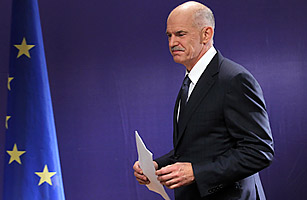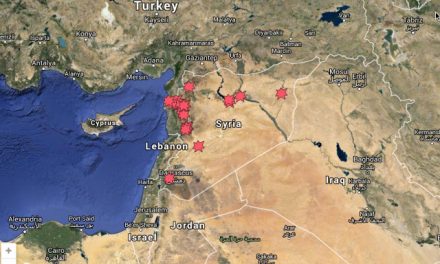By JOANNA KAKISSIS / ATHENS Prime Minister George Papandreou sent his country and the European Union into a major panic by announcing late Monday that he would ask for a public referendum so Greeks could vote on whether to accept the latest bailout package that euro-zone leaders worked for days to hammer out last week.
The stunning announcement threw the markets, especially in Europe, into chaos. The Athens exchange plummeted 6.8% because of fears that the government would fall. Worries intensified that Greece would default if Greeks voted against the bailout agreement in the referendum, which would be held early next year. And if Greece defaults, the debt crisis could take down other troubled euro-zone economies, like Italy. German Chancellor Angela Merkel and French President Nicolas Sarkozy planned to hold emergency talks on Greece with other euro-zone leaders and international lenders on Wednesday.
“This was an accident waiting to happen,” says Nikos Konstandaras, managing editor of the leading Greek daily Kathimerini. “Papandreou has always been in favor of direct democracy as part of his dream — or delusion — of running a Scandinavian social democracy. Now he got his opportunity to put it into practice. He probably thought that this was a masterstroke, forcing all the political parties and the nation itself to take a stand on whether they wanted to remain part of Europe or not, while at the same time relieving him of pressure and sharing the burden. He seems to have paid no attention to the consequences of his improvisation: the political storm within his own party, the unanimous fury of our partners in Europe, the effect on the markets.”(See how the Greek referendum puts the E.U. deal in jeopardy.)
It was unclear Tuesday whether Papandreou would survive the maelstrom. If his government goes down, the referendum will die, but it’s also unclear just who would step in to run Greece. Polls show that Greeks are so distrustful of all their politicians that no party would get enough votes for a clear majority. A coalition is likely to be the only option — but one that will only add to the uncertainties that roil the market and the question of Europe’s future.
But Konstandaras says the biggest concern now is that the IMF won’t approve the next installment of bailout loans, leaving Greece to default and possibly depart from the euro zone. “Things are that serious,” he says.
The proposed referendum is in some ways the embattled Papandreou’s last political card to play. Greece is heading into the fourth year of a brutal recession that many economists say has been worsened by austerity measures, which the country had to implement in exchange for billions in international bailout loans. The unemployment rate has hit 17.6%, more than double what it was before austerity. After months of fierce criticism and sometimes violent protests against the government, Papandreou wanted to shift responsibility for the fate of the country to Greeks themselves. He wanted to ask voters: If you don’t want the bailout, then what do you want? Bankruptcy? A return to the drachma? As Finance Minister Evangelos Venizelos said, “Do Greeks want to remain in Europe, with the euro, in a country that belongs to the developed world? Or do they want to go back to the 1960s?”(See pictures of the protests in Greece.)
“If this vote passes, then it could be the country’s turning point and Europe’s turning point,” a source close to the government told TIME.
Papandreou called the referendum “an act of patriotism.” But few in Greece seemed to view it that way. Opposition politicians called Papandreou irresponsible and selfish. His old college roommate at Amherst, Antonis Samaras, who leads the conservative New Democracy Party and has fought European leaders over the onerous terms attached to the bailouts, renewed his chronic cry for snap elections. “In his attempt to save himself, Mr. Papandreou set a divisive, blackmailing dilemma that endangers our future and our position in Europe,” Samaras said.
Even Papandreou’s own deputies from the center-left PASOK Party turned on him. Deputy Milena Apostolaki called the proposed referendum “a deeply divisive procedure” and declared herself an independent, whittling the party’s majority to just 152 seats out of 300. Another deputy demanded snap elections, and a third said a coalition government should be formed to keep the European deal from falling apart. Greek media also reported that six senior PASOK members demanded Papandreou’s resignation. The disarray endangered the government just days before a confidence vote in Parliament scheduled for Friday.(See why there is no joy in Greece over the E.U. deal.)
Greeks have been protesting for months against austerity, the bailout and the intervention of foreign powers. Some have even likened Papandreou’s government to a dictatorship because they believe it’s taken decisions without the consent of the people. Yet many were clearly confounded by Papandreou’s offer to let the people decide. Some said the Premier was trying to blame them for a default if they vote against the bailout.
“I think that Papandreou is trying to shirk his responsibility and attempting to transfer it all to us, so that if Greece goes bankrupt, the people will be to blame, not him,” says Marina Kainana, a 33-year-old personal assistant. She added that she’s scared that Greece will go bankrupt and be forced out of the euro zone. “Our prospects at the moment are very bleak,” she says.
Dimitrios-Adam Gropatsakis, a 32-year-old insurance salesman, says Papandreou should have called a referendum last year, when the country became the first euro-zone nation to ask for a bailout. “His proposal is pointless, too late and irresponsible,” Gropatsakis says. “We don’t need a referendum at this moment in time … Given the economic uncertainty and political confusion, I think elections are absolutely necessary. Our European partners need to know they are talking with someone they can trust.”
— With reporting by Nick Malkoutzis / Athens
See the details of Europe’s new debt-crisis agreement.
See TIME’s photo-essay “Outrage in Athens.”



















